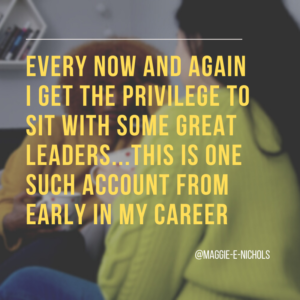Every now and again I get the privilege to sit with some great leaders. Some I simply observe – to see what they do and what their followers do in return. But on the rare occasion, I’ve been lucky enough to get them to slow down – to reveal the running commentary in their own head of why they do, what they do when they do. This is one such account from early in my career. 
We were just finishing an Innovation Session with a very high-profile company. Decisions had been made. Everyone knew what to do next. All in, a great day and session. At that moment, I ran into the CEO in the kitchen as he was grabbing a cup of coffee before heading off to the airport. He was the last one left.
He clearly felt good – a sort of quiet and confident high. And then, he just opened right up.
“You know, I don’t know half of what they’re doing, or what they’re about to do,” he says.
I was shocked. I was in the room with him and his team as they were making decisions and he seemed like he knew everything – every detail, every trade-off, every nuance.
I said, “I had no idea. You certainly played it off well.”
“I hope my team thought that too,” he replied. “You see, I’ve found that I simply cannot be present in every single thing we do as a company. Even the big stuff. But I have my ways of keeping everyone honest.”
“When they first present new ideas, I hit them hard with questions. And fast. I ask about one area of the idea but I go way down into the minutia.”
I asked him, “Why? I mean, aren’t you supposed to be thinking about strategy and your teams think about how to get it done?”
“It should be that way. But I have to build my own confidence too. I have to believe that they really have this. That they know it. And that when they don’t know it, they admit it. That’s why I get into unreasonable details when I know they can’t possibly know them all. Because I want to hear them say they don’t know. If they claim to know it all, I worry that they’re lying to me, or worse, lying to themselves. It makes me believe they don’t really love the idea, they’re trying to impress me. But they don’t realize…if they don’t know the answers, it’s not a big deal. I know they can go find out. But they’ll worry about it – and that’s my bigger picture play.
At the end of the day, I just want to feel confident that they’re worried about that issue. More than I can or would. I want to know that if they run into problems, they’ll fix them. That they’ll anticipate issues and think about them. I want to know that they have it in the back of their mind all the time…so I don’t have to. I want to see from their actions that they love it and they’ll care for it as much as I would, maybe more.”
That was one of my favorite learning moments from years past. And no matter where I am in an organization – volunteering, working, leading, following – I do always reflect on that experience and think:
Am I showing others that I love this effort/project?
Am I demonstrating through my actions that I’m worried about it more than they are?
Am I giving my (insert boss, customer/client, employee, investor, licensor, etc. here) confidence that I care so much about this that I’m thinking one step ahead?
If I am, I know I’m one step closer to not just winning their confidence, but doing the right thing while I’m at it.

